First Aid for USMLE Step 2 CK is a highly acclaimed resource designed to help medical students excel on the Clinical Knowledge exam․ Its concise, high-yield format focuses on essential topics, ensuring efficient preparation and mastery of critical concepts․ Widely regarded as a cornerstone of Step 2 CK study materials, it provides a well-organized framework for clinical scenarios, diagnostics, and management strategies․ This guide is particularly valued for its portability and ability to simplify complex information, making it an indispensable tool for exam success;
Overview of the First Aid for USMLE Step 2 CK PDF
The First Aid for USMLE Step 2 CK PDF is a comprehensive, well-organized study guide tailored for exam preparation․ It covers over 300 high-yield topics, focusing on clinical knowledge essential for success․ The guide includes concise summaries, clinical pearls, and mnemonics to aid retention․ With clear headings and bullet points, it ensures easy navigation․ Additionally, it integrates basic science concepts with clinical applications, providing a strong foundation for the exam․ Its portability and accessibility make it a valuable resource for mastering Step 2 CK content efficiently․
Importance of First Aid in USMLE Step 2 CK Preparation
First Aid holds a pivotal role in USMLE Step 2 CK preparation, offering a structured approach to high-yield clinical knowledge․ Its concise format ensures efficient study, focusing on frequently tested topics․ The guide bridges the gap between basic sciences and clinical practice, reinforcing essential concepts․ By condensing vast amounts of information into digestible sections, it enables focused study and active recall․ Many successful test-takers attribute their performance to First Aid, making it a cornerstone of effective Step 2 CK preparation and a key tool for achieving high scores․

Understanding the USMLE Step 2 CK Exam Format
The USMLE Step 2 CK is a one-day exam divided into eight 60-minute blocks, totaling nine hours․ It assesses clinical knowledge and decision-making skills across various medical scenarios, emphasizing time management and structured problem-solving․
Question Types and Exam Structure
The USMLE Step 2 CK features multiple-choice questions, including single-answer and extended matching formats․ The exam is divided into eight 60-minute blocks, each containing 40-50 questions․ Topics span internal medicine, surgery, pediatrics, obstetrics, psychiatry, and neurology․ Questions emphasize clinical diagnosis, pathophysiology, and patient management․ Time management is critical, as examinees must balance thorough analysis with efficient answering․ The structure reflects real-world clinical scenarios, requiring application of knowledge and problem-solving skills․ First Aid for Step 2 CK aligns with this format, providing high-yield content for targeted preparation․
Time Management and Test-Taking Strategies
Mastering time management is crucial for success on the USMLE Step 2 CK․ The exam consists of eight 60-minute blocks, each with 40-50 questions, requiring efficient answering․ Strategies include skimming questions, prioritizing high-yield topics, and using educated guessing․ Practicing with timed questions and simulating exam conditions helps build stamina and accuracy․ First Aid for Step 2 CK offers High-yield summaries and practice questions, enabling focused study and effective time allocation․ Regular review of performance metrics ensures continuous improvement and informed decision-making during the exam․
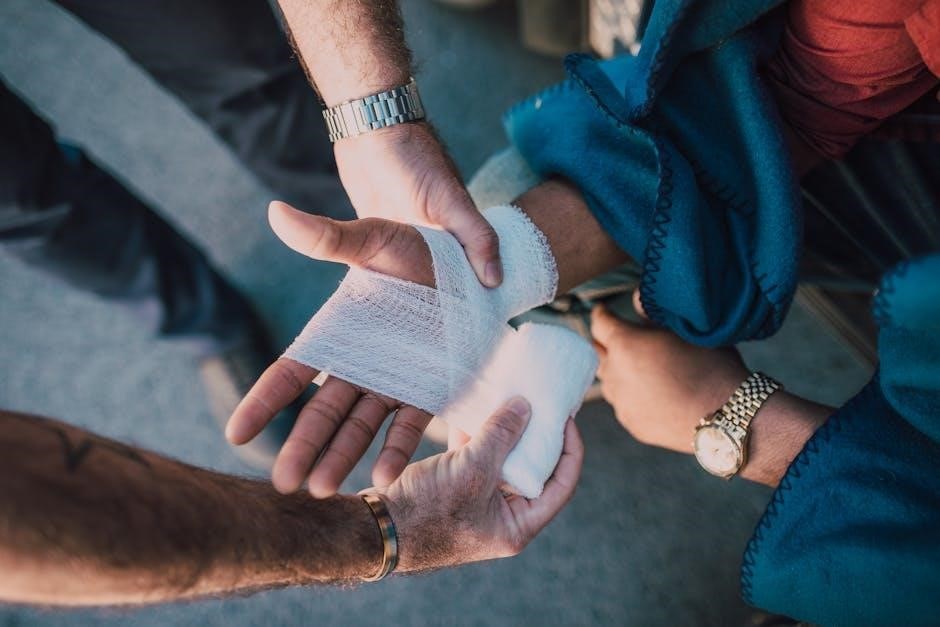
Clinical Knowledge Areas Covered in First Aid
First Aid for USMLE Step 2 CK covers a wide range of clinical topics, including internal medicine, surgery, pediatrics, obstetrics, psychiatry, and neurology, ensuring comprehensive exam preparation․
Internal Medicine and Medical Specialties
First Aid for USMLE Step 2 CK provides in-depth coverage of internal medicine and medical specialties, focusing on high-yield topics such as cardiovascular diseases, respiratory disorders, and gastrointestinal conditions․ It includes detailed algorithms for diagnosing and managing common illnesses, along with evidence-based treatment guidelines․ The guide also emphasizes key concepts in subspecialties like endocrinology, nephrology, and infectious diseases, ensuring a thorough understanding of complex clinical scenarios․ This section is particularly useful for mastering the core competencies required for the exam․
Surgery and Surgical Subspecialties
First Aid for USMLE Step 2 CK dedicates a comprehensive section to surgery and surgical subspecialties, covering high-yield topics such as surgical principles, trauma, and common procedures․ It emphasizes key areas like general surgery, cardiothoracic surgery, and neurosurgery, providing concise summaries of diagnoses, management, and postoperative care․ The guide also includes algorithms for surgical decision-making and highlights frequently tested clinical scenarios․ This section is tailored to help candidates master the surgical knowledge required for the exam, ensuring a strong foundation in both general and specialized surgical concepts․
Pediatrics and Adolescent Medicine
First Aid for USMLE Step 2 CK provides a detailed yet concise overview of pediatrics and adolescent medicine, focusing on high-yield topics such as developmental milestones, congenital disorders, and common pediatric illnesses․ It emphasizes clinical presentation, diagnosis, and management of conditions like asthma, diabetes, and infectious diseases․ The guide also covers vaccination schedules, growth and development charts, and behavioral health issues in adolescents․ By simplifying complex pediatric concepts, First Aid ensures candidates are well-prepared for this critical area of the exam, making it an essential resource for mastering pediatric care․
Obstetrics and Gynecology
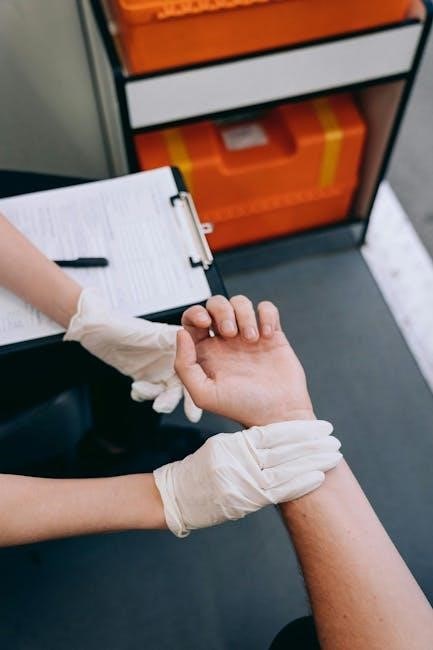
First Aid for USMLE Step 2 CK comprehensively covers obstetrics and gynecology, emphasizing high-yield topics such as pregnancy complications, gynecologic disorders, and preventive care․ It details key conditions like preeclampsia, gestational diabetes, and cervical cancer screening․ The guide also addresses common gynecologic issues, including menstrual disorders and sexually transmitted infections․ By focusing on clinical presentations, diagnostic criteria, and evidence-based management, First Aid equips candidates with the knowledge needed to excel in this critical exam section, ensuring a strong foundation in women’s health․
Psychiatry and Behavioral Sciences
First Aid for USMLE Step 2 CK provides a detailed yet concise overview of psychiatry and behavioral sciences, focusing on high-yield topics such as major psychiatric disorders, diagnostic criteria, and evidence-based treatments․ It covers key areas like schizophrenia, depression, anxiety disorders, and substance use, emphasizing clinical vignettes and patient management․ The guide also addresses neurodevelopmental and personality disorders, ensuring a strong foundation in this critical section of the exam․ By simplifying complex concepts, First Aid helps candidates master psychiatry and behavioral sciences efficiently․
Neurology and Neurosurgery
First Aid for USMLE Step 2 CK comprehensively covers neurology and neurosurgery, focusing on high-yield topics such as cerebrovascular diseases, neurodegenerative disorders, and seizures․ It emphasizes clinical vignettes, diagnostic criteria, and evidence-based treatments for conditions like stroke, dementia, and multiple sclerosis․ The guide also addresses key neurosurgical topics, including traumatic brain injury and spinal cord injuries․ By organizing information clearly and concisely, First Aid helps candidates master neurology and neurosurgery concepts efficiently, ensuring readiness for the exam․

Effective Study Strategies Using First Aid
Maximize efficiency by using active recall and spaced repetition․ Integrate First Aid with UWorld for comprehensive prep․ Annotate and customize the guide to tailor your learning experience effectively․
Annotating and Customizing the First Aid Guide
Annotating and customizing the First Aid guide enhances retention and personalizes learning․ Highlight key concepts, add notes from lectures or UWorld, and organize sections by specialty․ Tabs or color-coding can help navigate quickly․ Tailoring the guide to your strengths and weaknesses ensures focused study․ Regular reviews of annotations reinforce memory and clarify doubts, making it a dynamic, adaptive resource for exam preparation․
Integrating First Aid with Other Study Materials
Integrating First Aid with other resources like UWorld, Boards and Beyond, and clinical case studies enhances comprehension and retention․ Use UWorld for question practice, then reference First Aid for clarification․ Supplement with video lectures for complex topics․ Cross-referencing ensures a well-rounded understanding, filling knowledge gaps and reinforcing high-yield concepts․ This multi-resource approach maximizes study efficiency and prepares students for the exam’s diverse question styles and clinical scenarios․
Active Recall and Spaced Repetition Techniques
Active recall and spaced repetition are powerful techniques to enhance learning․ Test yourself frequently using flashcards or practice questions, focusing on high-yield topics from First Aid․ Spaced repetition involves reviewing material at increasing intervals, ensuring long-term retention․ These methods complement the concise, organized structure of First Aid for Step 2 CK, helping to solidify clinical knowledge and improve exam performance․ Regularly applying these strategies maximizes retention and prepares students for the exam’s challenging clinical scenarios and diagnostic questions․
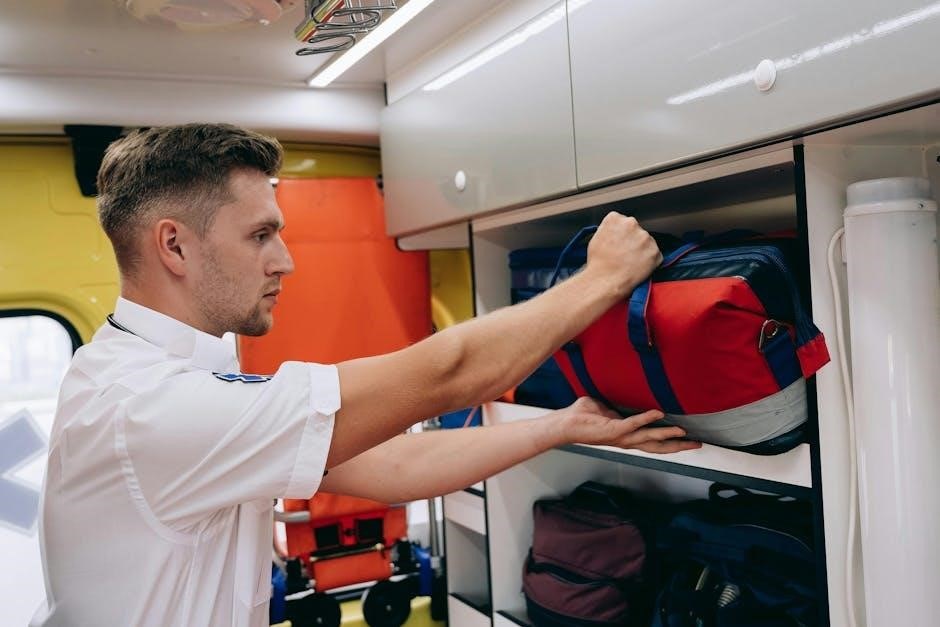
High-Yield Topics and Concepts
High-yield topics in First Aid for USMLE Step 2 CK include internal medicine, surgery, pediatrics, obstetrics, psychiatry, and neurology․ Mastering these areas ensures strong exam performance and clinical acumen․
Pharmacology and Therapeutics
Pharmacology and therapeutics are cornerstone topics in First Aid for USMLE Step 2 CK, emphasizing high-yield drugs, their mechanisms, and clinical applications․ The guide focuses on commonly tested medications, including antimicrobials, antihypertensives, and antidiabetics, with detailed explanations of their uses, side effects, and drug interactions․ Organized by organ system, it highlights key pharmacological principles and therapeutic strategies, supported by tables, charts, and clinical pearls․ This section equips students with the knowledge to approach complex drug-related questions confidently, ensuring a strong foundation for exam success and real-world patient care․
Pathophysiology and Disease Mechanisms
First Aid for USMLE Step 2 CK provides a concise yet comprehensive review of pathophysiology and disease mechanisms․ It bridges the gap between basic sciences and clinical practice, focusing on how diseases develop and present․ The guide simplifies complex processes, such as cellular signaling, immune responses, and metabolic pathways, into digestible sections․ High-yield topics like cardiovascular diseases, respiratory disorders, and metabolic syndromes are thoroughly covered, with clear connections to clinical findings and diagnostic approaches․ This section is designed to strengthen understanding of disease origins and manifestations, enabling students to approach clinical questions with confidence․
Clinical Algorithms and Decision-Making
First Aid for USMLE Step 2 CK excels in presenting clinical algorithms and decision-making frameworks․ It uses clear diagrams, flowcharts, and tables to guide students through diagnostic and management pathways․ High-yield algorithms cover common clinical scenarios, such as chest pain evaluation or respiratory distress․ These tools help students systematically approach complex cases, ensuring they can evaluate symptoms, prioritize differential diagnoses, and select appropriate diagnostic steps․ The guide also emphasizes evidence-based practices, enabling learners to make informed, efficient decisions during exams and in real patient care․

Practice Exams and Question Banks
Utilizing practice exams and question banks like UWorld alongside First Aid enhances exam preparation by simulating real test conditions and reinforcing clinical knowledge through high-yield questions․
Using UWorld and First Aid Together
Combining UWorld and First Aid creates a powerful study synergy․ UWorld provides realistic practice questions, while First Aid offers concise explanations and high-yield content․ This dual approach helps reinforce clinical knowledge, identify weak areas, and improve test-taking skills․ Many students annotate First Aid with UWorld insights, creating a personalized study resource․ Regularly reviewing incorrect answers from UWorld alongside First Aid ensures a deeper understanding of key concepts․ This integrated strategy is widely recommended for achieving success on the USMLE Step 2 CK exam․
Simulating Real Exam Conditions
Simulating real exam conditions is crucial for building stamina and reducing anxiety․ Set up a quiet, dedicated space free from distractions․ Use timed practice exams to mirror the 60-minute blocks of the actual test․ Incorporate First Aid and UWorld questions into your sessions․ Take scheduled breaks to mimic the exam’s structure․ Regularly review your performance to identify areas for improvement․ This approach helps acclimate you to the exam’s format and timing, ensuring you’re mentally prepared for the challenges of test day․ Consistency in simulation builds confidence and exam readiness․
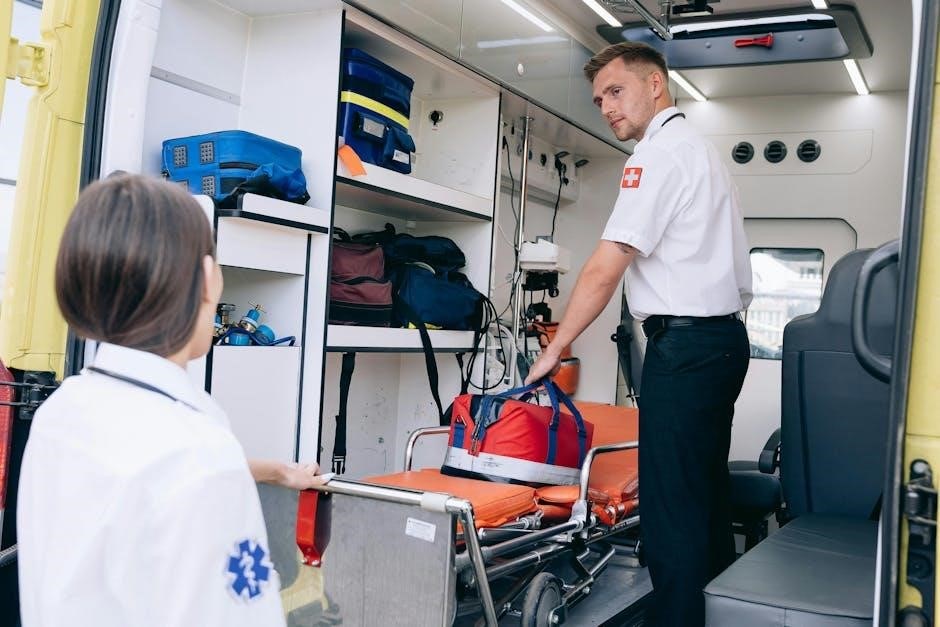
Managing Test Anxiety and Burnout
Address mental health by incorporating mindfulness, exercise, and adequate sleep into your routine․ Build a supportive study environment to reduce stress and foster resilience during preparation․
Mental Health and Wellness Strategies
Prioritizing mental health is crucial during USMLE Step 2 CK preparation․ Incorporate mindfulness practices, such as meditation or deep breathing exercises, to reduce stress․ Regular physical activity can improve focus and mood, while ensuring adequate sleep helps maintain cognitive function․ Establish a balanced routine that includes time for relaxation and hobbies to prevent burnout․ Seeking support from peers or mentors can also provide emotional relief․ By maintaining a healthy lifestyle and mindset, you can approach your studies with resilience and confidence, ultimately enhancing your exam performance․
Building a Supportive Study Environment
Creating a supportive study environment is essential for effective preparation․ Ensure your workspace is quiet, well-lit, and free from distractions․ Organize your materials, including the First Aid PDF, to quickly access key topics․ Incorporate tools like noise-canceling headphones or a comfortable chair to enhance focus․ Maintain a clean and clutter-free area to promote mental clarity․ Additionally, consider studying in a group setting with peers to foster accountability and shared learning․ A structured and comfortable environment can significantly boost productivity and overall exam readiness․
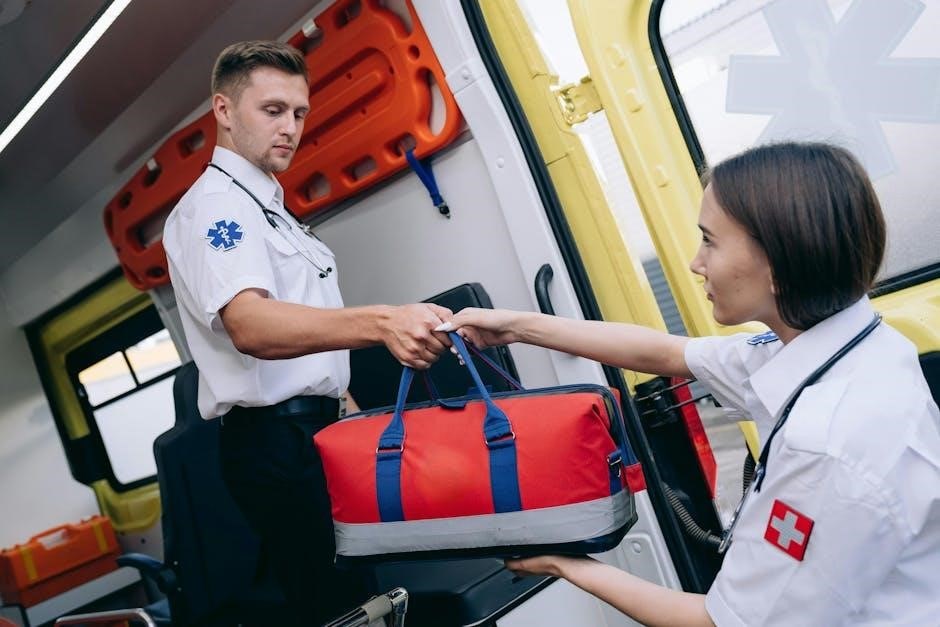
Supplementary Resources for Step 2 CK
Supplement your First Aid guide with video resources like Boards and Beyond, which offers detailed explanations of high-yield topics․ Mobile apps provide flexibility for on-the-go studying․
Boards and Beyond and Other Video Resources
Boards and Beyond is a highly recommended video resource for USMLE Step 2 CK preparation, offering comprehensive explanations of high-yield topics․ Its structured approach aligns seamlessly with First Aid, breaking down complex concepts into digestible segments․ Other notable resources include Pathoma for pathology and SketchyMedical for pharmacology, both of which provide visual and engaging learning experiences․ These video platforms complement First Aid by reinforcing key concepts and offering alternative perspectives, making them invaluable for visual learners․ They are widely praised for their clarity and ability to simplify difficult material․
Mobile Apps for On-the-Go Studying
Mobile apps like First Aid Flash Facts and USMLE-Rx provide convenient, portable study tools for mastering Step 2 CK material․ These apps feature flashcards, key terms, and high-yield notes, enabling quick reviews during commutes or breaks․ Many apps sync across devices, ensuring seamless study sessions․ They complement the First Aid guide by offering interactive learning formats, such as quizzes and image recognition exercises․ These resources are particularly valuable for maximizing study efficiency and reinforcing concepts on the go, making them essential for modern learners․

Final Tips for Success
Stay organized, maintain consistent effort, and utilize active recall and spaced repetition techniques․ Regularly review performance and adjust strategies to optimize learning outcomes effectively․
Stay Organized and Consistent
Maintaining a structured study schedule is crucial for success in USMLE Step 2 CK․ Use the First Aid guide to organize your study materials and ensure all high-yield topics are covered․ Prioritize active learning techniques, such as annotating and summarizing key concepts, to reinforce retention․ Consistency in studying helps build a strong foundation over time․ Regularly review progress, adjust your schedule as needed, and stay committed to your goals․ A well-organized and consistent approach ensures comprehensive preparation and confidence for the exam․
Review and Reflect on Practice Exam Performance
Regularly reviewing and reflecting on practice exam performance is essential for identifying strengths and weaknesses․ Analyze incorrect answers to understand gaps in knowledge and focus on high-yield topics from the First Aid guide․ Use this feedback to refine study strategies and improve decision-making skills․ Reflecting on performance helps consolidate learning, build confidence, and enhance problem-solving abilities․ By systematically reviewing practice exams, candidates can optimize their preparation and achieve a higher score on the USMLE Step 2 CK exam․
First Aid for USMLE Step 2 CK is a cornerstone resource, offering concise, high-yield content essential for exam success․ Mastering this guide ensures comprehensive preparation and confidence․
Maximizing the Use of First Aid for USMLE Step 2 CK
To maximize the effectiveness of First Aid for USMLE Step 2 CK, integrate it with active learning techniques such as spaced repetition and self-testing․ Regularly review and annotate high-yield sections, focusing on weak areas․ Combine it with UWorld for question practice, reinforcing concepts through real-world applications․ Utilize the guide’s clinical algorithms to improve decision-making skills․ By tailoring your study approach and staying consistent, you can optimize the benefits of First Aid, ensuring a strong performance on the exam․